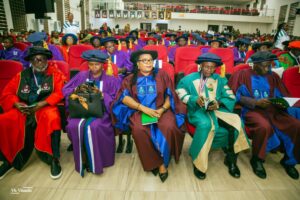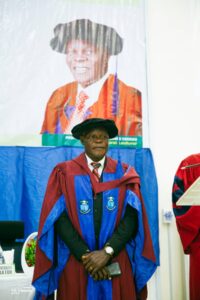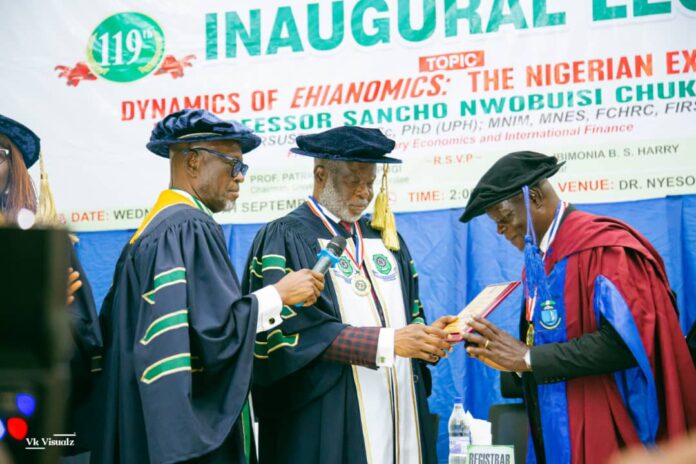It was a gathering of intellectuals as expected and a reflection of the importance of economics to everyday life at the Dr. Nyesom Ezenwo Wike Senate Building of Rivers State University on Wednesday, 24th September 2025, as Professor Sancho Nwobuisi Chukwu, a professor of Monetary Economics and International Finance, took the podium to deliver his much-anticipated inaugural lecture titled, “Dynamics of Ehianomics Economy, the Losses, and the Nigerian Experience.”
Professor Sancho began by drawing attention to the economic realities faced by Nigerians, realities rooted in conflicts such as civil war, insurgency, political instability, marginalization, and corruption. These conditions, he explained, gave rise to the concept of Ehianomics.

Ehianomics, he noted, is an economic paradigm that interprets survival and adaptability rather than relying solely on conventional indicators such as GDP growth, foreign reserves, or stock market performance. It is an economy shaped by adversity and adaptive resilience.
The term reflects how individuals, households, and communities in Nigeria have unknowingly built shock absorbers that keep them from collapse. They find alternatives to stay on their feet, sourcing new resource flows and devising strategies to withstand repeated disruptions. Farmers, for instance, may shift from imported crops to local sourcing or adopt new crops in response to insecurity.
Communities, he explained, develop survival mechanisms with little or no state support. These include informal trade, cooperative labour, shared community risks, migration (popularly called japa) as an economic response, subsistence enterprises, and indigenous credit systems.
Ehianomics, therefore, offers a bottom-up reinterpretation of economic agency — shaped not by abstract models but by lived experiences, forged in struggle, and expressed in the quiet determination of market women, displaced youth, and informal innovators who refuse to surrender their economic agency.

Drawing on metaphors, Professor Sancho likened the Nigerian economy to a palm tree — once tall and full of potential, signifying a healthy nation with systemic stability and sustained growth. But like the palm tree gradually eaten away by the weaver bird, Nigeria’s economy has been disrupted by colonialism, civil war, oil dependency, military coups, and neoliberal reforms.
Yet, amid the ruins, he emphasized the possibility of regeneration and regrowth. Just as ecosystems heal after disruption, economies too can recover. Nigeria, he said, must reconstruct itself by finding new growth paths, redefining productivity patterns, and reshaping power dynamics. Much of this regeneration is already visible in informal systems of trade and survival.
These losses, however, did not affect all groups equally. Political elites, contractors, security firms, urban elites, diaspora returnees, multinational corporations, NGOs, development professionals, digital entrepreneurs, and tech startups often benefited from turbulence. Meanwhile, ordinary citizens bore the brunt: unemployment deepened, farmers and traders abandoned fields, food shortages, and inflation spread, and future generations were denied quality education, nutrition, and healthcare. Against this backdrop, the professor posed a stark question:
“Who are the winners, and who are the losers?”
As part of his recommendations, Professor Sancho urged Nigeria to secure the foundations of growth through conflict prevention and resolution, move beyond oil by building a resilient economic paradigm, develop stronger social safety nets to protect the vulnerable, and promote inclusive policies that shift the nation from elite capture to shared prosperity.
“Just as the palm withstands storms by bending, shedding, and regrowing, so too must Nigeria evolve from reactive crisis management to proactive, regenerative economic planning,” he said.
“By creating generation, not repetition, Nigeria can convert this history of vulnerability into our future of structural resilience and inclusive prosperity, ensuring that what is passed down is not just survival but a renewed economic legacy anchored in dignity and shared growth.”
He did not mince words about the dangers of corruption, declaring:
“Until we separate looters from working Nigerians, the next generation of youths will think that looting and stealing is a career.”
The lecture underscored that Ehianomics is more than an abstract theory. It is a mirror of Nigeria’s lived experience: a story of an economy shaped by fragile foundations, scarred by missteps, yet still capable of renewal.
Bringing the event to a close, the Vice Chancellor of Rivers State University, Professor Zeb Obipi, delivered the closing remark. He commended Professor Sancho for his scholarly contribution and urged the Nigerian government to engage with the lecture’s insights.
“If our leaders take these recommendations seriously, the dynamics of Ehianomics will be such that our people will not be struggling daily for survival,” he said.
His words of encouragement marked a fitting conclusion to a thought-provoking and impactful inaugural lecture.
Before joining the Rivers State University, Prof. Sancho Chukwu had served at the Federal University, Wukari, where he grew through the ranks to the top of his career.
Prof. Sancho Nwobuisi Chukwu is a specialist in monetary economics and international finance. He has, to his credit, several publications in local and foreign journals, and the proposed lecture promises to contextualize Nigeria’s economic challenges and also point the way for recovery and growth that is sustainable.
By Miracle Chidinma Amaechi




